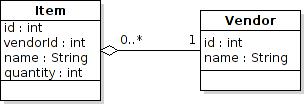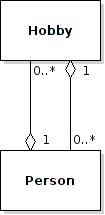One-to-many relationships
Let's say we want to enhance our inventory system by representing vendors, so that each item has a vendor. In UML:

Like the Item class, the Vendor class has an id field. Each vendor will be assigned a unique id. The vendor's unique id is then referenced from the Item class as the vendorId field.
This is a one-to-many relationship because each item is associated with exactly one vendor, and each vendor is associated with an arbitrary number of items.
In SQL:
create table items (
id integer primary key autoincrement,
vendor_id integer
name varchar(80) unique,
quantity integer
)
create table vendors (
id integer primary key autoincrement,
name varchar(80) unique
)
Now, let's say we want to get all of the items offered by a particular vendor. All we need to know is the unique id of the vendor:
select items.*
from items, vendors
where items.vendor_id = vendors.id
and vendors.id = ?
In this query, we are assuming that the id of the vendor whose items we are searching for will be bound to the placeholder (?).
Many-to-many relationships
Occasionally you might need to model a many-to-many relationship:

In this example, a Person can have many hobbies, and because more than one person can share the same hobby, a hobby is associated with an arbitrary number of persons.
At the database level, we can model such relationships using a link table:
create table persons {
id integer primary key autoincrement,
firstname varchar(80),
lastname varchar(80),
...
)
create table hobbies {
id integer primary key autoincrement,
name varchar(80),
...
)
create table person_hobbies {
person_id integer,
hobby_id integer
)
Each row in the person_hobbies table links a particular person with a particular hobby.
Note that it would be a good idea to create a unique index on the combination of person_id and hobby_id in the person_hobbies table, to ensure that there is at most one link between one person and one hobby.
